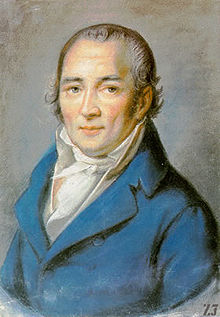Johann Peter Hebel: Difference between revisions
LinkFA-Bot (talk | contribs) m Bot: Link GA +de |
No edit summary |
||
| Line 60: | Line 60: | ||
[[pt:Johann Peter Hebel]] |
[[pt:Johann Peter Hebel]] |
||
[[fi:Johann Peter Hebel]] |
[[fi:Johann Peter Hebel]] |
||
[[sv:Johann Peter Hebel]] |
|||
Revision as of 23:05, 2 June 2010
Johann Peter Hebel | |
|---|---|
 | |
| Born | 10 May 1760 |
| Died | 22 September 1826 (aged 66) Schwetzingen near Heidelberg |
Johann Peter Hebel (10 May 1760 – 22 September 1826) was a German short story writer and dialectal poet, most famous for his collection of alemannic tales Schatzkästlein des rheinischen Hausfreundes (Treasure chest of the family friend by the Rhine).
Life
Hebel's father, a weaver and batman who loved learning, died when Hebel was little over a year old. As a result, Hebel was brought up amidst poverty-stricken conditions in the village of Hausen im Wiesental, where he received his earliest education. A promising student, he found friends who enabled him to complete his school education and to study theology (1778–1780) at Erlangen.
At the end of his university course he was for a time a private tutor, then became teacher at the gymnasium in Karlsruhe, and in 1808 was appointed director of the school. He was subsequently appointed member of the Consistory and evangelical prelate.

Memorials have been erected to him at Karlsruhe, Lörrach, Hausen im Wiesental, Basel and Schwetzingen.
Works

Hebel is one of the most widely read of all German popular poets and writers. His poetical narratives and lyric poems, written in the Alemanic dialect, are popular in the best sense.
His Alemannische Gedichte (1803) bucolicize, in the words of Goethe, the whole world in the most attractive manner (verbauert das ganze Universum auf die anmutigste Weise). Indeed, few modern German poets surpass him in fidelity, naiveté, humour, and in the freshness and vigour of his descriptions.
The anecdotes and tales contained in the Schatzkästlein des rheinischen Hausfreundes belong to the best class of German stories, and according to August Friedrich Christian Vilmar (1800–1868) in his Geschichte der deutschen Literatur are worth more than a cartload of novels (wiegen ein ganzes Fuder Romane auf). Admirers of his work include Goethe, Franz Kafka, Walter Benjamin, Ludwig Wittgenstein and Martin Heidegger.
Bibliography
- "Allemannische Gedichte. Für Freunde ländlicher Natur und Sitten." Aarau : Sauerländer 1821
- "Alemannische Gedichte. Für Freunde ländlicher Natur und Sitten. Poésies Alémaniques. Pour les amis de la nuture et des mœurs rurales"
Translated by Raymond Matzen.
Bilingual edition alemannic/french, Kehl am Rhein: Morstadt Verlag 2010, ISBN 978-3-88571-362-3
- "Alemannische Gedichte. Für Freunde ländlicher Natur und Sitten. Poésies Alémaniques. Pour les amis de la nuture et des mœurs rurales"
External links
- Comprehensive scope of information, curriculum vitae, pictures, articles, the complete 290 "Kalendergeschichten" (Tales from the calendar) as well as the complete "Alemannische Gedichte" (alemanic poems)
- Homepage of the Primary/Secondary-School of his formerly homeborough Hausen im Wiesental
- Works by Johann Peter Hebel at Project Gutenberg
This article incorporates text from a publication now in the public domain: Chisholm, Hugh, ed. (1911). Encyclopædia Britannica (11th ed.). Cambridge University Press. {{cite encyclopedia}}: Missing or empty |title= (help)
